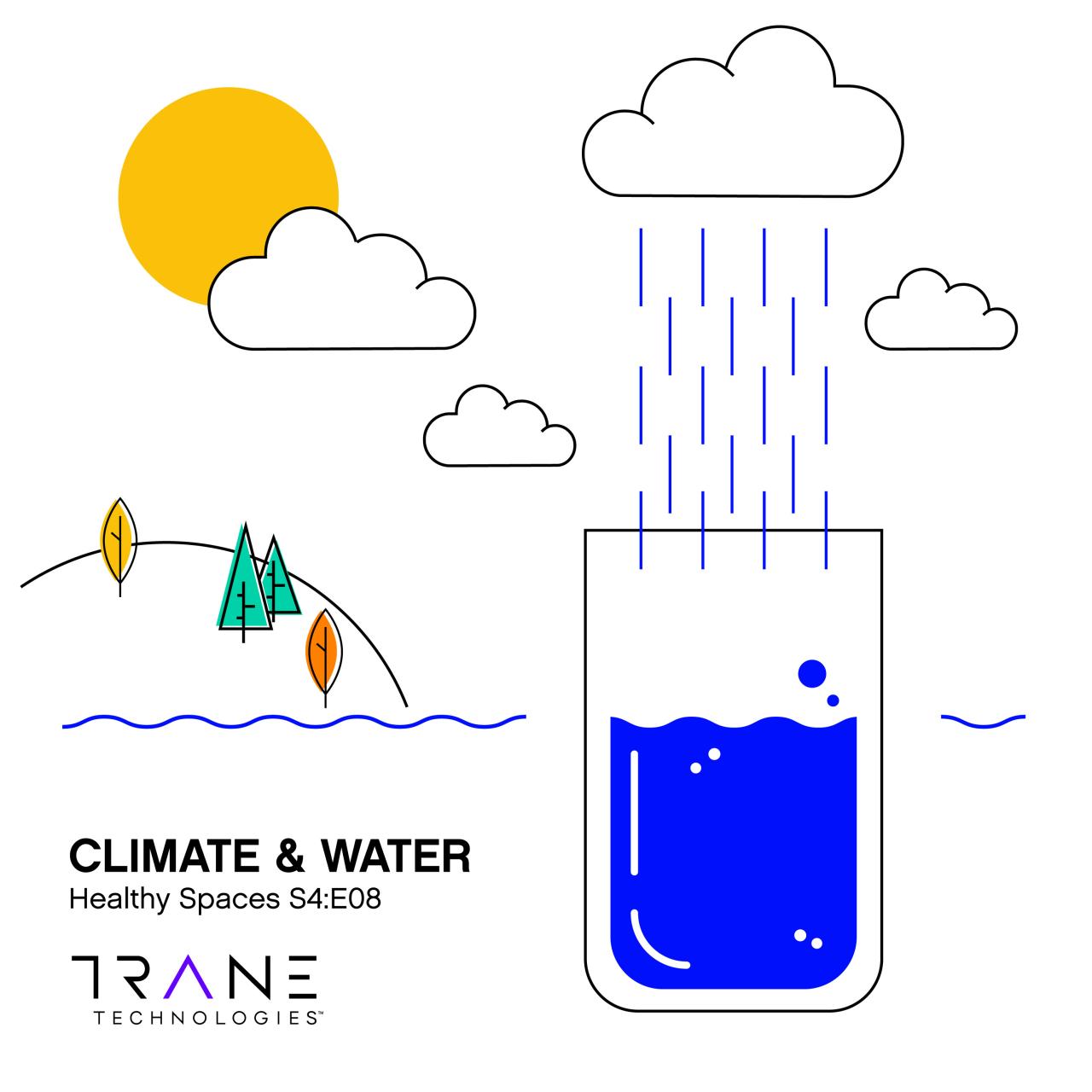Healthy Spaces Podcast: Season 4, Episode 8 - Climate and Water
Rhea-AI Summary
The latest episode of the Healthy Spaces Podcast features Emilio Tenuta, Chief Sustainability Officer at Ecolab, discussing the important role of water stewardship in corporate sustainability strategies. Hosted by Dominique Silva and Scott Tew from Trane Technologies, the conversation highlights how climate change impacts water resources and the importance of integrating water management into climate action plans. Tenuta emphasizes the need for industries to collaborate on innovative solutions, citing initiatives like the Water Resilience Coalition and California Water Resilience Initiative. Ecolab's 2023 Watermark Study reveals consumer concerns over water scarcity and holds businesses accountable for water conservation. The episode underscores the necessity of public-private partnerships to address global water challenges.
Positive
- Ecolab promotes innovative water stewardship in corporate sustainability strategies.
- Consumer surveys reveal prioritization of clean water over climate and pollution issues.
- Ecolab collaborates in major initiatives like the Water Resilience Coalition and California Water Resilience Initiative.
Negative
- Global water supply deficit anticipated to reach 56% if current trends continue.
- 3 billion people currently live under water stress conditions, and one in ten lack access to clean water and sanitation.
News Market Reaction
On the day this news was published, TT gained 0.24%, reflecting a mild positive market reaction.
Data tracked by StockTitan Argus on the day of publication.
NORTHAMPTON, MA / ACCESSWIRE / September 10, 2024 / Trane Technologies
Water is essential - but often missing from corporate sustainability targets. Ecolab's Chief Sustainability Officer Emilio Tenuta joins the podcast to discuss the importance of including water in the climate conversation.
Sustainability leaders must balance big picture, aspirational goals with practical solutions that meet customers' needs. Remarkably, one of the most consistent needs from customers is clean, available water. So what role should water play in sustainability strategy?
In this episode of the Healthy Spaces podcast, Emilio Tenuta, Senior Vice President and Chief Sustainability Officer of Ecolab, joins host Scott Tew for a conversation about the impact of climate change on our water, the importance of including water stewardship in sustainability targets and the ways in which industries can collaborate to deliver innovative solutions that are good for business, people and the planet.
Listen to the full episode to learn more about how the power of technology and collaboration are helping build a cleaner and more resilient global water supply - and why it matters.
Episode Guests
Host: Dominique Silva, Marketing Leader EMEA, Trane Technologies
Host: Scott Tew, VP Sustainability, Trane Technologies
Guest: Emilio Tenuta, Senior Vice President and Chief Sustainability Officer, Ecolab
Subscribe
Find all episodes on your favorite podcast platforms:
Apple Podcasts
Spotify
YouTube
Amazon Music
How are you building healthy spaces in your organization or community?
Share your story with us and learn more about the Healthy Spaces Podcast.
Transcript
[00:00:06] Dominique: 2023 was the hottest year on record, according to NASA. And if we don't reduce carbon emissions, we will experience more and more record-breaking temperatures. But heat waves are not the only phenomena caused by climate change.
[00:00:22] Dominique: It has wider ranging effects, too.
[00:00:25] Emilio: Climate change is happening, but it's also being expressed through water. In many ways, we don't raise water up the ladder of challenges that we need to manage or mitigate or adapt to. And so, I feel that this has broad implications for businesses and communities that we live in.
[00:00:43] Dominique: You just heard from Emilio Tenuta, Senior Vice President and Chief Sustainability Officer of Ecolab. And I'm Dominique Silva, and you're listening to Healthy Spaces, the podcast exploring how technology and innovation are transforming the spaces where we live, learn, work, and play.
[00:01:02] Dominique: In this episode, co-host Scott Tew sits down with Emilio to discuss why water scarcity is such a threat. And how Ecolab is forming coalitions to find solutions and improve resiliency. We'll find out how companies are challenging their industries and policy makers to hold more accountability and adopt scalable solutions for our climate.
AUDIO PROMPT - MUSIC FADE OUT
[00:01:33] Dominique: First, let's hear from Emilio on what he does and how Ecolab is drawing attention to the connection between climate and water.
[00:01:42] Emilio: I spent the last 13 years focused on building our sustainability and impact at Ecolab and our strategy really around how we operationalize climate and water around the company which is obviously a core part of our strategy. But for Ecolab our purpose of the company is really to protect what is vital to life. And so, for us a lot of the work that I do is focused on not only the traditional things that we do as chief sustainability officers within our operations and enterprise, but also working with customers because our business strategy focuses on the water and climate and hygiene impact that we can have with our customers. So, I do spend quite a bit of time really focused on working with some of the biggest brands in the world really helping them achieve their business and sustainability goals. And last point, so the Ecolab foundation and community giving team is also part of sustainability. And I think it's important for our audience to know that part of the climate and water discussion is also about understanding the social value of water and climate stewardship, right? And I think that's a big part of where we've gone with the foundation to really drive that going beyond environmental, but how does the environmental enable social benefits with communities around the world.
[00:03:09] Scott: You've mentioned several phrases that I want to explore a bit in more depth. One of those is you keep mentioning climate and water, and I'm not sure that the audience quite understands or sees a connection there. I read something recently, the World Economic Forum, WEF, put out a paper that said that 80 percent of publicly listed companies have a climate goal, but 5 percent have biodiversity goals, and I know you keep mentioning a phrase, climate and water. Can you make the connection for the audience?
[00:03:41] Emilio: We keep seeing the climate is changing rapidly, and the impacts are felt around the world. And in many ways, the way we're feeling that impact is really expressed through water. If you think about the extreme weather events, droughts, heat waves we've had in Europe, the flooding challenges, and a number of other issues that we see that really are representative of the fact that climate change is happening, but it's also being expressed through water. In many ways, we don't raise water up the ladder of challenges that we need to manage or mitigate or adapt to. And so, I feel that this has broad implications for businesses and communities that we live in. And so, we at Ecolab, like Trane, have set bold, ambitious climate targets in line with the science-based target initiative. A 1.5-degree pathway. And in many ways, we've also are experiencing along the way, the challenges that we face around water quality, quantity, and access. And so, the world, according to the World Resource Institute, we'll have a 56 percent water deficit, supply deficit if we keep at business as usual. That has really big implications. Today, 3 billion people live in water stress conditions and one in ten lack access to clean water and sanitation. So, what does this all mean is that we're really, if we're going to attack a climate strategy and have a very robust strategy around what we need to do to mitigate and adapt to climate, it's really about also implementing a water stewardship strategy that namely, I often talk about this, Scott, that when you think of manufacturing 75 percent of the energy that flows through a manufacturer, depending on that type of industry, is connected to their water systems. You have to pump, treat, cool, heat water and that takes energy. And so, in many ways, we feel that in order to have a robust climate strategy you really need to implement a water stewardship strategy that also has broad implications in a community where you operate because obviously you mentioned the word nature. There's also the degradation that we're seeing because of the water challenges where nature is actually impacted and the ecosystems that we depend on for our feedstock, if you're in the food and beverage industry or in pharma or life sciences, they're at risk. And then, that also is a risk for those organizations where water is a dependency. So, water obviously being used to make in this case for Ecolab the products that in technology and solutions we sell to our customers every day.
AUDIO PROMPT - MUSIC FADE IN
[00:06:26] Dominique: These solutions which Ecolab is exploring aren't just for internal use. Their plan is much broader, and it aims to get businesses and industries rethinking their own water usage so that they can build resilience and have a net positive effect on the environment. And one way Ecolab is promoting this conversation is through the Water Resilience Coalition.
AUDIO PROMPT - MUSIC FADE OUT
[00:06:56] Emilio: There's three things. We have the technology of today. You don't have to go to the moon to solve the water and climate crisis. The second is water and climate are linked as we just talked about, and the third is you can't do it alone. Ecolab is a founding member, and we're proud of this, of the Water Resilience Coalition. And we also helped launch this past year, the California Water Resilience Initiative, which will be another opportunity, I think, for another podcast. But what we're saying by doing this is really saying that the Water Resilience Coalition is an industry to really drive the priority of the corporate agenda for CEOs who have risk that they're facing related to water based on global operations. And so, there's 37 member companies with a market cap of about 4.7 trillion. And these companies are committed to achieving what they refer to as a Net positive water impact by 2030, which essentially is this, it's giving back to the watershed that we're operating in more than we're taking from it. And that's important because water being hyper localized, we're working in watersheds where water stress would be quantity, quality, or access is a big issue. And so, we have a part to play in the private sector to join forces with the UN global compact, who's the organization that actually facilitates the Water Resilience Coalition, and the open call to action, which really was announced in 2023 at the first UN water conference in nearly 50 years, by the way. But one of the things they talked about is we need an open call to action for increased public private partnerships to converge in 100 priority basins around the world that are contributing to water security for 3 billion people. That is a big, big, big deal. And I think one that we need to really leverage the power of collaboration to solve. And that's why the goal of the Water Resilience Coalition being at 37 companies today is to get to 150 companies where we found that if you get to the 150 largest water users and their supply chain, that'll impact one third of the freshwater use on the planet. So, as you can see, industry has a big role to play.
[00:09:17] Scott: And part of your role, Emilio, has been to get the word out and to build these avenues of information. I have not read the study yet, but I want to ask you about it. The Ecolab Watermark Study. You issued it, I think, last year, and it's another example of your work to help others understand the issue of access to fresh and clean water. Why would Ecolab and your team work on a study like this one?
[00:9:43] Emilio: Well, you and I, I think have for years worked together about different stakeholders that we're trying to reach, one being investors for example. That has been obviously a big focus for many companies. And so, we get to learn more and more about what are the things that they really care about to keeps some up at night. What we found is that for consumer companies and B2C companies that there is a consumer, an end user here, that also really is getting concerned about the challenges they're seeing around the environmental issues around the world, namely climate pollution. And in this case, water, and we were interested in getting kind of a what is the sentiment of consumers today. And in 2023, we launched this study that showed that water impacts really three key points. I'll just share them. One is that through these thousands of interviews that were done in nine markets around the world that what we found is that clean available water was paramount to consumers above, are you ready for this? Climate and pollution. Now part of why we think that is because we think that climate change, as you know, even though we're seeing the effects in some regions more than others, is a bit of a slow drip right? And so, with clean water, it's immediate. And we've seen this in places around the world where they face these immediate challenges. The second was they hold businesses and government responsible for addressing water conservation. And then the third is something you and I've talked about is that consumers are a bit cynical, right? The fact that companies are setting these bold ambitious goals, but do they really have a plan to achieve them? And I think these are the three really key points that came out of that study, and we're going to continue. It'll be a perennial survey that we do that really reflects on what is that consumer sentiment when it comes to these issues that we care about related to climate and water.
[00:11:51] Scott: And I guess you'll use a study like this, Emilio, to sort of map out your actions going forward, right?
[00:11:58] Emilio: That is correct. It really supports, well, as you know, we have our 2030 impact goals that are focused on our ability to commercially develop solutions that own not only propel our business strategy and growth, but also how we impact the planet and the implications to society. And so, to us, this is at the heart of that. And I feel like it's really important to our work as a company.
[00:12:27] Dominique: As we just heard, Ecolab and the Water Resilience Coalition are making waves and changing attitudes towards water usage. We conclude this episode by finding out what other collaborations Emilio is working on.
[00:12:44] Emilio: The Water Resilience Coalition, we mentioned the California Water Resilience Initiative, the only reason I somewhat go there is because it is one that is about a year old, Scott, and we've launched it namely because the state of California and the governor, Governor Newsom's, water plan in California, which was launched in 2022 and they just had an update about a year ago. There's a 10 percent water deficit that the science is telling us that will be experienced in California by 2040. So no longer the puts and takes are going to balance. And so, that is a big deal. And so, we've launched this California Water Resilience Initiative with many other big brands, General Mills being one of the other co-leads. We've got Amazon and others, Walmart involved. The reason we're bringing this to the forefront is because, again, the private sector and the public sector need to work together to really solve this. And many of us have operations in what is the number one economy in the U.S., right? Number five globally. So, it's an economic powerhouse and we're hosting an annual meeting in Sacramento. There'll be about well over a hundred attendees in Sacramento to really talk about the roadmap in terms of the plans and the projects that we're implementing in the state of California with the state government.
[00:14:05] Scott: And how can listeners find out more about that? Is it on a website somewhere?
[00:14:10] Emilio: Yeah, if you go to California Water Resilience Initiative.com. You'll find it. We are excited about this, Scott. It is one that I think will have a big impact, especially when you think about the economic powerhouse that California is.
[00:14:28] Dominique: A big thank you to Emilio for joining us on today's episode, where we learned about the relationship between the changing climate and water scarcity. At Trane Technologies, we believe that every job is a sustainability job, and every role provides an opportunity for impact. That's why each week on the podcast, we'll feature how someone is building healthy spaces in their organization or community.
[00:14:55] Dominique: This week, we're sharing a submission from Barbara Andreassend, Tax Manager at Trane Technologies in Brussels. Barbara is making her workplace more sustainable by leading efforts to cut down on plastic and paper waste at the office, and she's encouraging everyone to join in through fun awareness campaigns.
[00:15:17] Dominique: She's also organized neighborhood cleanup events where coworkers and their families come together to make a difference. More recently, Barbara teamed up with a local non-profit which supports youth refugees called SB Overseas. Together, they planted hundreds of trees in the outskirts of Brussels.
[00:15:37] Dominique: Barbara, thank you for all the energy you bring into making your workplace and community a healthier place to work and live.
[00:15:46] Dominique: Would you like to share how you're building healthy spaces too? Well, to share your story, you can visit us at tranetechnologies.com/healthyspacespodcast. Thank you for listening in to the Healthy Spaces podcast, where we explore how climate technology and innovation are transforming the spaces where we live, work, learn, and play.
[00:16:08] Dominique: If you want to find out more about our conversation today make sure you check out the show notes and remember to rate and review us in your favorite podcast app. That's it for today's episode. We'll see you next time.

View additional multimedia and more ESG storytelling from Trane Technologies on 3blmedia.com.
Contact Info:
Spokesperson: Trane Technologies
Website: https://www.3blmedia.com/profiles/trane-technologies
Email: info@3blmedia.com
SOURCE: Trane Technologies
View the original press release on accesswire.com






